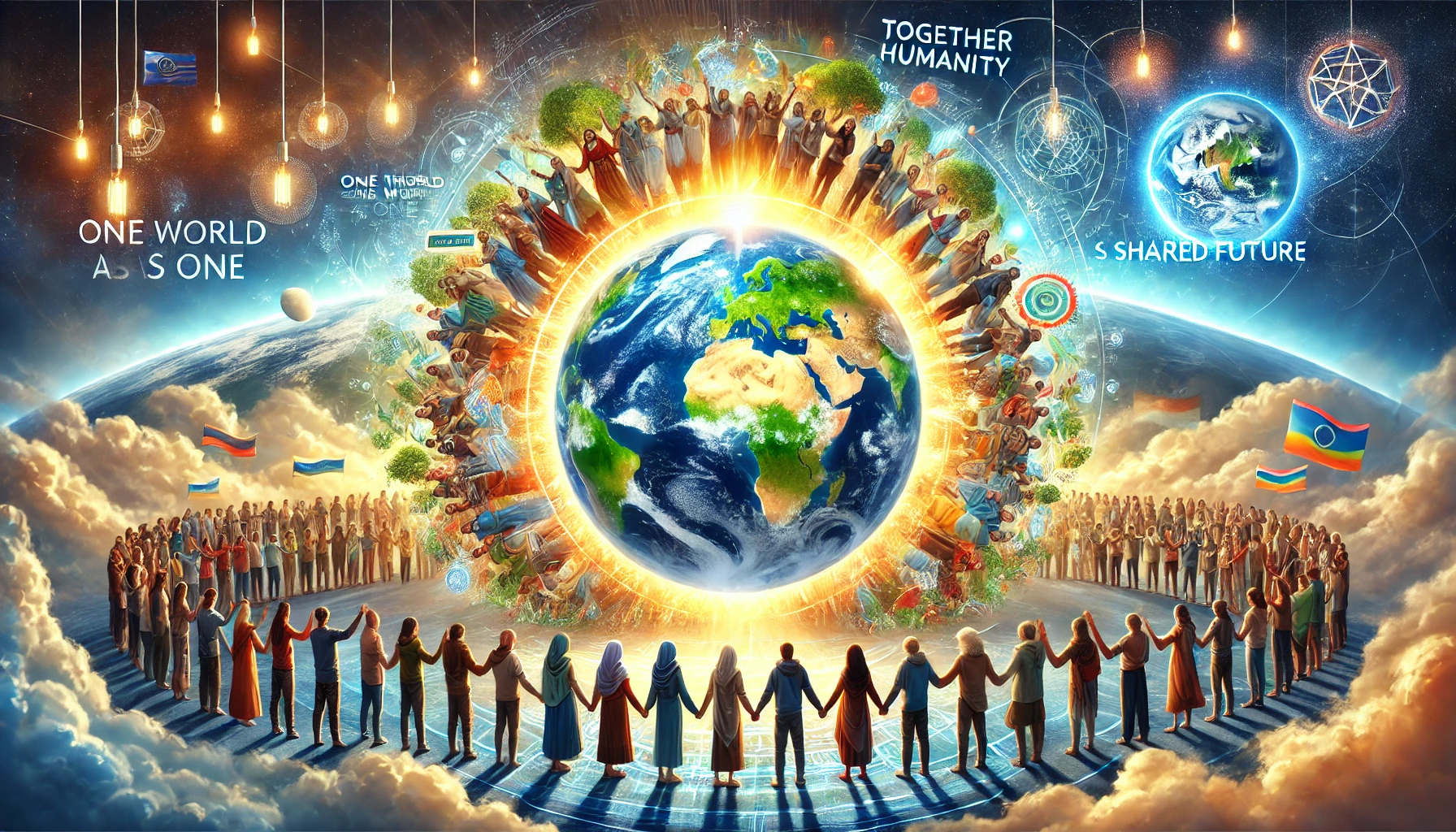As we observe the modern world, contradictions and divisions seem omnipresent. On one side, resources are excessively wasted, while on the other, countless lives struggle in hunger and poverty. One side relentlessly pursues luxurious living, while the other struggles to secure basic survival rights.
Why, in such an advanced era, can the world still not achieve peace and prosperity? The root cause lies not in the scarcity of resources but in how we perceive and understand resources and wealth. Only by transitioning from the “me vs. you” mindset to a holistic “we” perspective can society truly move towards shared benefits and shared prosperity.
The Root of Division and Conflict: The Separatist Mindset
Human society is deeply entrenched in division and conflict, rooted in the “separatist mindset.” We habitually classify resources and interests into “mine” and “yours,” stubbornly guarding what we believe is ours, even when resources are in excess, refusing to share them with others.
This mentality is deeply embedded in humanity’s fear of scarcity. Throughout history, the threat of insufficient resources has instilled a habit of hoarding and monopolizing. However, in the modern era, productivity has reached a level sufficient to meet the basic needs of the majority. The excessive concentration of resources has transcended survival necessity, becoming a hindrance to societal efficiency.
When massive wealth is controlled by a small group, resources cannot circulate effectively, reducing overall societal benefits, widening the wealth gap, and exacerbating social tensions and divisions. Worse still, these conflicts eventually threaten the safety and interests of the wealthy, creating a vicious cycle.
Like passengers on a lifeboat, if everyone attempts to seize more space without considering the boat’s balance, the inevitable result is collective demise.
Human Unity: Starting from Shared Interests
In reality, humanity is a unified entity. Whether from a biological, sociological, or ecological perspective, we are interconnected and interdependent:
- Biologically: Human genes are nearly identical; our lives are part of an inseparable whole.
- Sociologically: Every individual’s actions, whether consumption or production, directly or indirectly influence the survival of others. No one can exist independently, disconnected from society.
- Ecologically: We share the same skies and earth. Any local environmental destruction has global ecological repercussions.
Moreover, the wealth possessed by the affluent is not solely due to their effort, intelligence, and diligence. It also depends on external factors such as timing, geographical advantages, societal conditions, and the labor and contributions of others. Education provided by society, technological advancements, economic environments, and collective labor all form the foundation of wealth creation. Thus, wealth cannot simply be regarded as personal private property but must be seen as the collective product of society and the Earth’s resources.
Wealth creators deserve a larger share of the distribution as a reward for their contributions, but this distribution must be fair and limited. Wealth should not be monopolized while ignoring the needs of others and society. Understanding this is key to resolving division, promoting collective development, and achieving universal prosperity and peace.
Resource Sharing: Unlocking Potential and Creating More Value
Modern technological and productive advancements have given humanity the capacity to meet the basic needs of the global population. The problem lies not in resource scarcity but in unequal distribution and inefficient utilization:
- Food Waste: The amount of food wasted globally each year could feed hundreds of millions of hungry people.
- Knowledge Barriers: Many people cannot reach their potential due to a lack of education and technological support.
- Wealth Concentration: Enormous wealth is hoarded by a minority, stalling resource circulation and social progress.
Combenism advocates for resource sharing, enabling efficient flow and fair distribution, reducing waste, increasing creation, and unlocking human potential. Sharing is not just an effective means to resolve inequality; it is the only path to lasting peace and prosperity.
Abandoning Zero-Sum Thinking, Advancing Collaborative Gains
Traditional zero-sum thinking suggests, “If you win, I lose.” This mindset fuels endless conflict, hindering social progress. In contrast, collaboration fosters mutual benefits across society, unlocking “collaborative gains”:
- Collaboration Drives Growth: By sharing resources and opportunities, more individuals can innovate and contribute to societal progress.
- Ensuring Long-Term Security: Reducing division and conflict creates a more stable social environment where everyone can live with peace of mind.
- Achieving True Prosperity: Beyond material wealth, fostering mutual respect among individuals and harmony between humanity and nature.
Conclusion: Together Toward the Future of Human Unity
History teaches us that division and competition only bring more suffering and insecurity. If we aspire to build a peaceful and prosperous future, we must abandon the mindset of division and embrace the belief in “human unity.” Combenism offers a pathway to shared benefits and shared prosperity, paving the way for collective advancement.
When we choose to let go of hostility and approach others with goodwill, when we move beyond division and embrace cooperation, and when we firmly believe that “this belongs to all of us,” a fairer, more peaceful, and more prosperous future will no longer be a distant dream.
Let us start today, uniting as one, actively sharing resources, taking action to help more people, and working together toward a world where everyone benefits, and everyone thrives!
人类一体:共益主义引领共同受益与共同繁荣的未来
当我们环顾当今世界,矛盾与对立似乎无处不在。一边是资源的极度浪费,另一边却是无数生命在饥饿和贫困中苦苦挣扎;一边是奢华生活的无限追求,另一边却是基本生存权利的缺失。
为什么在如此先进的时代,世界依然无法实现和平与繁荣?问题的根源并非资源不足,而在于我们对资源和财富的认知方式。唯有从“我 vs. 你”的对立思维转向“我们”的整体视角,才能真正推动社会走向共同受益与共同繁荣。
分别心:对立与冲突的根源
人类社会深陷对立与冲突,根源在于“分别心”。我们习惯于将资源与利益划分为“我的”和“你的”,并固执地守护自己的部分,哪怕资源早已过剩,也不愿与他人分享。
这种心理深深扎根于人类对匮乏的恐惧。漫长的历史中,资源不足的威胁迫使人类养成占有与囤积的习惯,这种记忆刻在我们的骨子里。然而,在现代社会,生产力已经足以满足大多数人的基本需求,对资源的过度垄断已然超越生存的必要,转而成为社会效率的阻碍。
当大量财富被少数人垄断,资源无法有效流通,不仅削弱了社会的整体利益,还导致贫富差距扩大,激化了社会矛盾与撕裂。更严重的是,这种矛盾反过来会威胁富裕者自身的安全与利益,形成了恶性循环。
正如乘坐同一艘孤舟的旅客,若每个人都试图抢占更多空间,却无视船只的平衡,最终的结果只会是全体覆没。
人类一体:从共同利益出发
事实上,人类是一体的,无论从生物学、社会学还是生态学的角度,我们都命运相连、息息相关:
- 生物学层面:人类基因几乎完全相同,我们的生命是彼此依存的整体。
- 社会学层面:每个人的行为都直接或间接地影响他人的生存,没有人能够完全脱离社会而独立存在。
- 生态学层面:我们共享同一片天空与大地,任何地方的破坏都会对全球生态产生影响。
此外,富裕者所拥有的财富,不仅源于个人的努力、聪明与勤奋,还依赖于天时地利人和等外部条件。社会提供的教育、技术支持、经济环境,以及他人付出的劳动,都为财富创造提供了基础。因此,财富不能简单地视为个人的私产,而应被看作是社会与地球资源的共同成果。
财富创造者理应获得更大的分配比例,以奖励其贡献,但这份分配应是公平且有限度的,而非将财富完全据为己有、无视他人和社会的需求。只有意识到这一点,才能从根本上化解对立,推动共同发展,真正实现全体的富足与和平。
资源共享:释放潜力,创造更多价值
现代科技与生产力的进步,已经使人类具备满足全球人口基本需求的能力。问题不在资源短缺,而在于分配不均和利用效率低下。
- 粮食浪费:每年全球浪费的粮食足以养活数亿饥饿人口。
- 知识壁垒:许多人因缺乏教育和技术支持,无法释放潜力。
- 财富集中:巨大的财富被少数人囤积,导致资源流通停滞,社会停滞不前。
共益主义倡导资源共享,通过高效流动与合理分配,减少浪费、增加创造,释放人类潜力。共享不仅是解决不平等问题的有效手段,更是通向长久和平与繁荣的必由之路。
抛弃零和思维,迈向合作红利
传统的零和思维认为,“你赢了,我就输了”。这种观念制造了无休止的对抗,阻碍了社会进步。而合作则能带来全社会的共赢,释放“合作红利”:
- 合作促进增长:通过资源与机会的共享,激发更多人参与创新与生产,推动社会整体发展。
- 保障长远安全:减少对立与冲突,创造稳定的社会环境,让每个人都能安心生活。
- 实现真正富足:超越物质层面的满足,实现人与人之间的尊重与信任,人与自然的和谐共处。
结语:携手迈向人类一体的未来
从历史的教训中可以看到,分裂与争夺只会带来更多的痛苦与不安。如果我们希望构建一个和平与繁荣的未来,就必须抛弃“你我之分”,用“人类一体”的信念引领社会发展,用共益主义的实践铺设通往共同受益与共同繁荣的道路。
当我们选择放下敌意,以善意相待;当我们摆脱对立,以合作共赢;当我们坚信“这是我们的”,一个更加公平、和平与繁荣的未来便将成为现实。
让我们从今天开始,团结彼此,主动共享资源,用行动帮助更多人,共同迈向一个所有人都能受益、所有人都能繁荣的世界!
